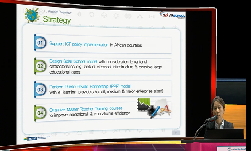Technology is promoted as a way to produce a meaningful view of mathematics for students, but to date, there is still no consolidated view of how to appropriately or effectively implement technology in teaching activities. Using a large-scale teacher...
http://chineseinput.net/에서 pinyin(병음)방식으로 중국어를 변환할 수 있습니다.
변환된 중국어를 복사하여 사용하시면 됩니다.
- 中文 을 입력하시려면 zhongwen을 입력하시고 space를누르시면됩니다.
- 北京 을 입력하시려면 beijing을 입력하시고 space를 누르시면 됩니다.
https://www.riss.kr/link?id=T13136296
- 저자
-
발행사항
[S.l.]: The University of Wisconsin - Madison 2012
-
학위수여대학
The University of Wisconsin - Madison Curriculum & Instruction
-
수여연도
2012
-
작성언어
영어
- 주제어
-
학위
Ph.D.
-
페이지수
201 p.
-
지도교수/심사위원
Adviser: Eric J. Knuth.
-
0
상세조회 -
0
다운로드
소속기관이 구독 중이 아닌 경우 오후 4시부터 익일 오전 9시까지 원문보기가 가능합니다.
부가정보
다국어 초록 (Multilingual Abstract)
Technology is promoted as a way to produce a meaningful view of mathematics for students, but to date, there is still no consolidated view of how to appropriately or effectively implement technology in teaching activities. Using a large-scale teacher survey and a multiple-case study of four different mathematics classrooms, this study explores the complex and dynamic nature of teachers' views regarding what it means to successfully use technology in the socially mediated and culturally bound context of the classroom. Results illustrate that features of appropriate and effective technology-based instruction from the teachers' standpoint are interrelated with the nature of their technology use in teaching mathematics, and this interdependent relationship is bound to a multitude of factors associated with their personal characteristics and teaching environments. However, the features for gauging success of technology integration that teachers actually consider in their practice are generally far removed from those proposed in the research paradigm, which reflect broad educational reform goals. Hence, to leverage technology as a medium for engaging with mathematics differently than what students have traditionally experienced, research in the field needs to provide teachers with clearer guidelines for successful technology-based instruction. Some elements, such as the use of technology to provide more access to mathematics, the process of technology-based teaching from teachers' perspectives, interrelationships among factors affecting technology use, and the consideration of technology as a pedagogic cultural artifact, deserve closer scrutiny when developing theoretical constructs for accounts of technology integration. Findings of the study also indicate a need to help teachers develop knowledge needed for fruitful integration of technology, and to offer better teaching conditions in mathematics classrooms. If technology is to find its place in education, we need a clearer, more clarified conceptual foundation and a better support system than what currently exists in the field to move us closer to an articulated research agenda and productive classroom practice.
분석정보
연관 공개강의(KOCW)
-

Education Policy at the Party Conferences
Teachers TV Teachers TV -

Further Education: Work Experience
Teachers TV Teachers TV -

Early Sex Education: The Debate
Teachers TV Teachers TV -

2014 이러닝 국제 콘퍼런스 : What is the Lessons from Education Support Project~
한국교육정보진흥협회 Boseon, Kim -

Alcohol Education: Here's What We Want
Teachers TV Teachers TV






